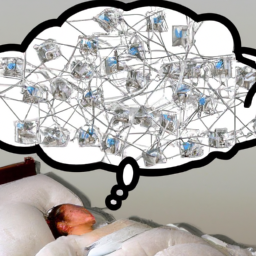Have you ever had a dream about someone that left you feeling confused or overwhelmed? Whether it was an ex-partner, a long-lost friend, or a complete stranger, these dreams can linger in our minds, prompting us to question their meaning and significance.
As a dream researcher and therapist, I’ve spent years studying the science behind dreaming and helping others interpret their dreams. Through my work, I’ve come to understand that our dreams are often a reflection of our deepest emotions and concerns, and that they can provide valuable insights into our subconscious minds.
In this article, we’ll explore the theories of dreaming, the importance of dream interpretation, common themes in dreams about someone, the role of emotions in dreams, unresolved feelings and issues, symbolism in dreams, techniques for remembering dreams, and coping with recurring dreams.
So, let’s dive in and uncover the mystery behind why we keep having dreams about someone.
Key Takeaways
- Dreams about someone can be a sign of unresolved feelings and issues that need to be addressed in waking life.
- Unresolved conflict, unrequited love, trauma or loss, and unfinished business are possible reasons for dreaming about someone repeatedly.
- Techniques like keeping a dream journal, practicing relaxation and visualization exercises, and seeking therapy can help understand and cope with recurring dreams.
- Understanding the significance of dreams about someone can provide valuable insights into our emotional state, relationships, and personal growth.
Theories of Dreaming
Ready to learn about the fascinating theories of dreaming and why they might explain why you keep having dreams about someone? Dreams have long been a subject of great interest and fascination to psychologists, neuroscientists, and cultural theorists alike.
There are many different theories of dreaming, but one of the most popular is the neuroscientific explanation. According to this theory, dreams are the result of the brain’s attempt to process and consolidate memories. During sleep, the brain replays and processes the memories from the day, creating connections between new and old information. This process can sometimes lead to the appearance of individuals or events that are not directly related to the memories being processed.
Additionally, cultural influences can play a role in the content of dreams, such as recurring themes or symbols that may be specific to certain cultures. Understanding these theories can help shed light on why you might keep having dreams about someone, even if they are not a significant part of your daily life.
Dreams can be an incredibly powerful tool for self-discovery and personal growth. By interpreting the symbols and themes that appear in your dreams, you can gain insight into your subconscious mind and better understand your emotions, fears, and desires.
In the next section, we’ll explore the importance of dream interpretation and how it can help you unlock the hidden meanings behind your dreams.
The Importance of Dream Interpretation
Understanding the meaning behind our nighttime experiences can help us gain insight into our subconscious thoughts and emotions. Dream interpretation is an essential tool that can aid in this process. The benefits of interpreting dreams are numerous. It can help us identify unresolved emotions or issues that we may not be aware of consciously.
It can also provide clarity on situations in our waking life and help us make better decisions. However, it’s important to note that dream interpretation has its limitations. Dreams can be highly subjective, and what may have a particular meaning for one person may not have the same significance for another. Additionally, dreams can be influenced by external factors such as stress, medication, or even the food we eat.
Therefore, it’s essential to approach dream interpretation with an open mind and not take it as the absolute truth. Moving on to the next section, common themes in dreams about someone can give us further insight into the significance of these experiences.
Common Themes in Dreams About Someone
I’ve had my fair share of dreams about someone, and I know how confusing and unsettling they can be. But did you know that there are common themes in such dreams?
Falling in love with someone is a popular one, as is experiencing conflict or arguments with them. But what about dreams where you reconcile with someone?
Let’s explore these themes and what they might mean.
Falling in love
As I’m falling deeper in love, my dreams are consumed with thoughts of that special someone, their laughter echoing in my mind like a sweet melody. I find myself constantly daydreaming about them, imagining our future together, and longing for their presence.
It’s no surprise that my subconscious mind is also fixated on them, manifesting in my dreams. Signs of attraction are present in my dreams about them, such as feeling a strong connection and chemistry. I can sense their energy and presence, even in the dream world.
Different types of love are also explored in my dreams, from the passionate and romantic to the nurturing and supportive. However, these dreams can also bring up insecurities and anxieties about the relationship, highlighting the importance of open communication and honesty with my partner.
As I navigate through these dreams, I am reminded to cherish the love and connection we share, and to work through any conflicts that may arise with patience and understanding. As much as I enjoy these dreams, they can also reveal potential conflicts or arguments that may arise in the future.
It’s important to acknowledge and address these issues in a healthy and respectful manner, to ensure the longevity and strength of our relationship.
Conflict or arguments
When you’re in a relationship, conflicts and arguments are bound to happen at some point. It’s normal to have disagreements with your partner, but it’s important to resolve them in a healthy way.
Communication breakdowns often lead to misunderstandings, which can escalate into bigger issues. It’s essential to communicate openly and honestly with your partner, even when it’s difficult.
Resolving conflict requires both partners to be willing to listen and compromise. Avoid placing blame and instead focus on finding a solution that works for both of you. Remember, the goal is not to win the argument, but to strengthen the relationship.
With patience and understanding, you can work through any disagreements that arise and come out stronger on the other side.
Transitioning into the subsequent section about ‘reconciliation,’ it’s important to understand that reconciliation is not just about making up after a fight. It’s about addressing the underlying issues that led to the conflict and finding a way to move forward together.
In the next section, we’ll explore the importance of forgiveness and how it can help you rebuild your relationship.
Reconciliation
In the previous subtopic, we talked about how conflicts or arguments can lead to dreams about someone. However, the good news is that reconciliation is possible, and it can help rebuild trust and heal relationships. It takes effort and commitment from both parties, but the outcome can be worth it.
Here are three things that can help with reconciliation:
-
Communication: Open and honest communication is essential to rebuilding trust and healing relationships. Both parties should express their feelings and concerns without judgment or blame.
-
Forgiveness: Forgiveness is a critical step in the reconciliation process. It means letting go of past hurts and moving forward with a new beginning.
-
Patience: Healing relationships takes time, and it’s essential to be patient throughout the process. It’s important to remember that progress may be slow, but it’s worth it in the end.
When it comes to dreams, reconciliation can be a common theme. Dreams about someone can be a reflection of our desire to reconcile with them and heal the relationship.
In the next section, we will explore the role of emotions in dreams and how they can help us understand ourselves better.
The Role of Emotions in Dreams
You’re probably wondering why you keep dreaming about that person – well, emotions play a huge role in our dreams, acting as a powerful driving force that can bring them to life. Our emotions are deeply connected to our subconscious and can influence the things we dream about. For example, if you’re experiencing strong emotions towards someone, it’s very likely that you’ll have dreams about them. Dreams are a way for our subconscious to process emotions and experiences that we may not be fully aware of in our waking life.
To better understand the role of emotions in dreams, let’s take a look at this table:
| Emotion | Dream Scenario |
|---|---|
| Fear | Being chased or attacked |
| Love | Romantic encounters |
| Anger | Fighting or arguing with someone |
| Sadness | Crying or feeling lost |
As you can see, each emotion can create a specific dream scenario. If you’re dreaming about someone often, it’s important to examine what emotions you may be feeling towards them. It could be a sign that there are unresolved feelings and issues that need to be addressed in your waking life. In the next section, we’ll explore this idea further and discuss how unresolved feelings can impact your dreams.
Unresolved Feelings and Issues
Unresolved feelings and issues can haunt our dreams, like ghosts from the past that refuse to be put to rest. When we dream about someone repeatedly, it may be a sign that we have unresolved emotions or past experiences with that person. Here are four possible reasons why you may be dreaming about someone over and over again:
-
Unresolved conflict: If you had an argument or disagreement with that person that was never resolved, it may be playing out in your dreams as your subconscious tries to find a resolution.
-
Unrequited love: If you have romantic feelings for that person but never acted on them or they weren’t reciprocated, your dreams may be a way for your mind to process those emotions.
-
Trauma or loss: If you experienced a traumatic event or loss involving that person, your dreams may be a way for your mind to process that event and the associated emotions.
-
Unfinished business: If you had unfinished business with that person, such as a project or plan that was never completed, your dreams may be a way for your mind to work through that unfinished business.
As we explore the symbolism in dreams, we can gain a deeper understanding of the messages our subconscious is trying to communicate.
Symbolism in Dreams
Symbolism in dreams can reveal deeper meanings and insights into our subconscious thoughts and emotions. Dream analysis is a powerful tool that can help us understand why we keep having dreams about someone.
When we dream about someone, it may not necessarily mean that we have unresolved feelings for them. Instead, it can be a symbol for something else entirely. For example, dreaming about an ex-partner could represent our desire for closure or a need to move on from the past.
Subconscious communication is often the language of our dreams. We may not always understand what our subconscious is trying to tell us, but with practice and patience, we can learn to interpret our dreams more effectively. Paying attention to the details in our dreams, such as the people, places, and objects, can provide valuable insights into our emotional state.
Understanding the symbolism in our dreams can help us gain a deeper understanding of ourselves and our relationships. With this knowledge, we can work towards resolving any issues that may be affecting our waking life.
Understanding the symbolism in our dreams is just one step towards unlocking the power of our subconscious mind. By learning techniques for remembering our dreams, we can further strengthen our ability to communicate with our subconscious.
Techniques for Remembering Dreams
Using techniques like keeping a dream journal, setting intentions before bed, and practicing relaxation and visualization exercises, I’ve been able to increase my ability to remember my dreams.
Dream journaling has been particularly helpful for me in remembering details of my dreams. I keep a notebook and pen by my bedside and write down any details I can remember as soon as I wake up. This helps me to capture the emotions, people, and places I encountered in my dreams.
Lucid dreaming is another technique that can be used to remember dreams. This is when you become aware that you’re dreaming while you’re in the dream. With this awareness, you can then take control of the dream and actively participate in it.
Practicing relaxation and visualization exercises such as meditation and yoga before bed can also help to clear your mind and increase your chances of remembering your dreams. By using these techniques, we can tap into the messages from our subconscious mind and gain a better understanding of ourselves.
As important as it is to remember our dreams, coping with recurring dreams can be a challenge. However, there are techniques that can be used to address these dreams and we’ll explore them in the next section.
Coping with Recurring Dreams
Now that we know how to remember our dreams, let’s move on to the current subtopic: coping with recurring dreams. Recurring dreams can be frustrating and even frightening, especially when they involve someone we know. These dreams can leave us feeling confused and unsure of what they mean. But there are ways to cope with them.
One technique that can be helpful is journaling. By writing down our dreams, we can identify patterns and gain insight into what might be causing them. We can also explore our emotions and reactions to the dreams, which can help us process any unresolved feelings we have towards the person in our dreams. Additionally, we can use journaling as a tool to set intentions before going to sleep, such as asking for guidance or clarity on the situation. Here is a table that summarizes the benefits of journaling:
| Benefits of Journaling | ||||
|---|---|---|---|---|
| Helps identify patterns | Gain insight into dreams | Process unresolved emotions | Set intentions before sleep | Provides a tool for self-reflection |
In addition to journaling, therapy techniques can also be beneficial. Working with a therapist can help us explore any underlying issues or traumas that may be contributing to our recurring dreams. They can also provide coping mechanisms and tools for managing any anxiety or stress that the dreams may be causing. It’s important to remember that recurring dreams are not necessarily a sign of something negative, but rather an opportunity for growth and self-reflection. With the right tools and support, we can learn to understand and cope with these dreams in a healthy way.
Frequently Asked Questions
Can dreams about someone predict the future?
Premonition dreams can provide insight into possible future events, but interpreting dream symbols is key. It’s important to consider personal emotions and experiences in the analysis. Trust your intuition and seek guidance for clarity.
Is it possible for someone to appear in your dreams if you have never met them in real life?
Yes, it is possible for someone to appear in your dreams even if you haven’t met them in real life. Lucid dreaming techniques and dream journaling can help you explore the subconscious and understand why certain people or symbols appear in your dreams.
Can dreams about someone be a sign of a mental health issue?
Dreams about someone can indicate psychological implications and may require dream interpretation. It’s important to seek guidance from a mental health professional to understand any underlying issues and work towards resolution.
Why do some people remember their dreams more vividly than others?
I’ve noticed that some people have better sleep quality and are more likely to remember their dreams vividly. Regular dream journaling can also improve dream recall and help with self-discovery.
Can medication or substance use affect the frequency or content of dreams about someone?
The effect of emotions and sleep patterns can influence dreams about someone, as well as the role of subconscious thoughts. Medication or substance use may also alter the frequency or content of these dreams. It’s important to address underlying issues and seek support if needed.
Conclusion
In conclusion, dreaming about someone can be a complex and emotional experience. As we’ve explored the theories of dreaming, we’ve discovered that dreams can reflect our subconscious desires, fears, and concerns.
Dream interpretation can be a useful tool in understanding the meaning behind these dreams and uncovering unresolved issues. While common themes in dreams about someone may include romantic feelings or unresolved conflicts, the role of emotions cannot be underestimated.
Dreams are often a reflection of our emotions, and these emotions can manifest in symbolic ways. Like a painter using colors to create a masterpiece, our minds use symbols to convey our emotions and experiences.
Overall, it’s important to remember that recurring dreams about someone can be a sign of unresolved feelings or issues that need to be addressed. By using techniques to remember and interpret our dreams, we can gain insight into our subconscious minds and work towards resolving these issues.
Like a navigator using a compass to find their way through the sea, we can use dream interpretation to guide us through the depths of our own minds and emotions.









